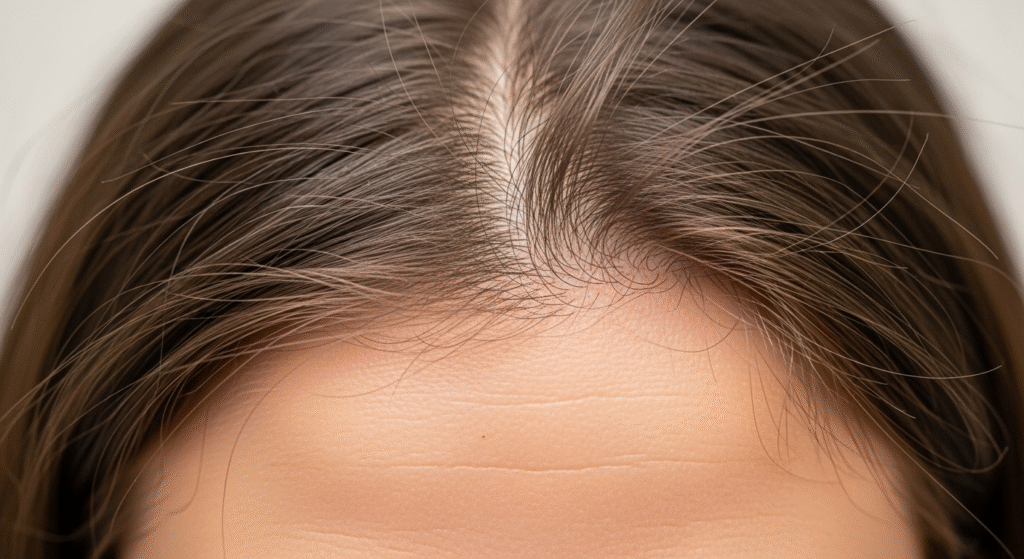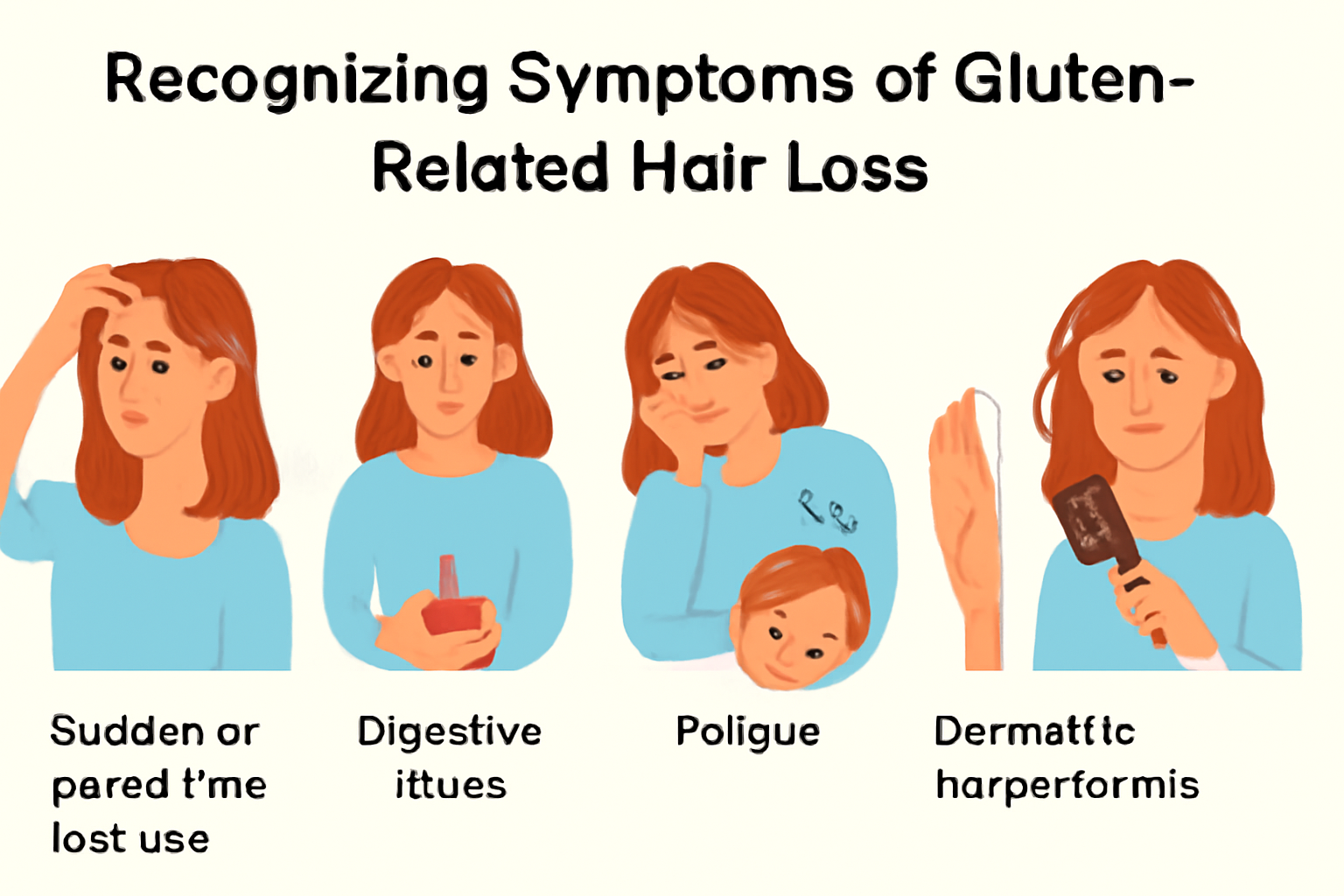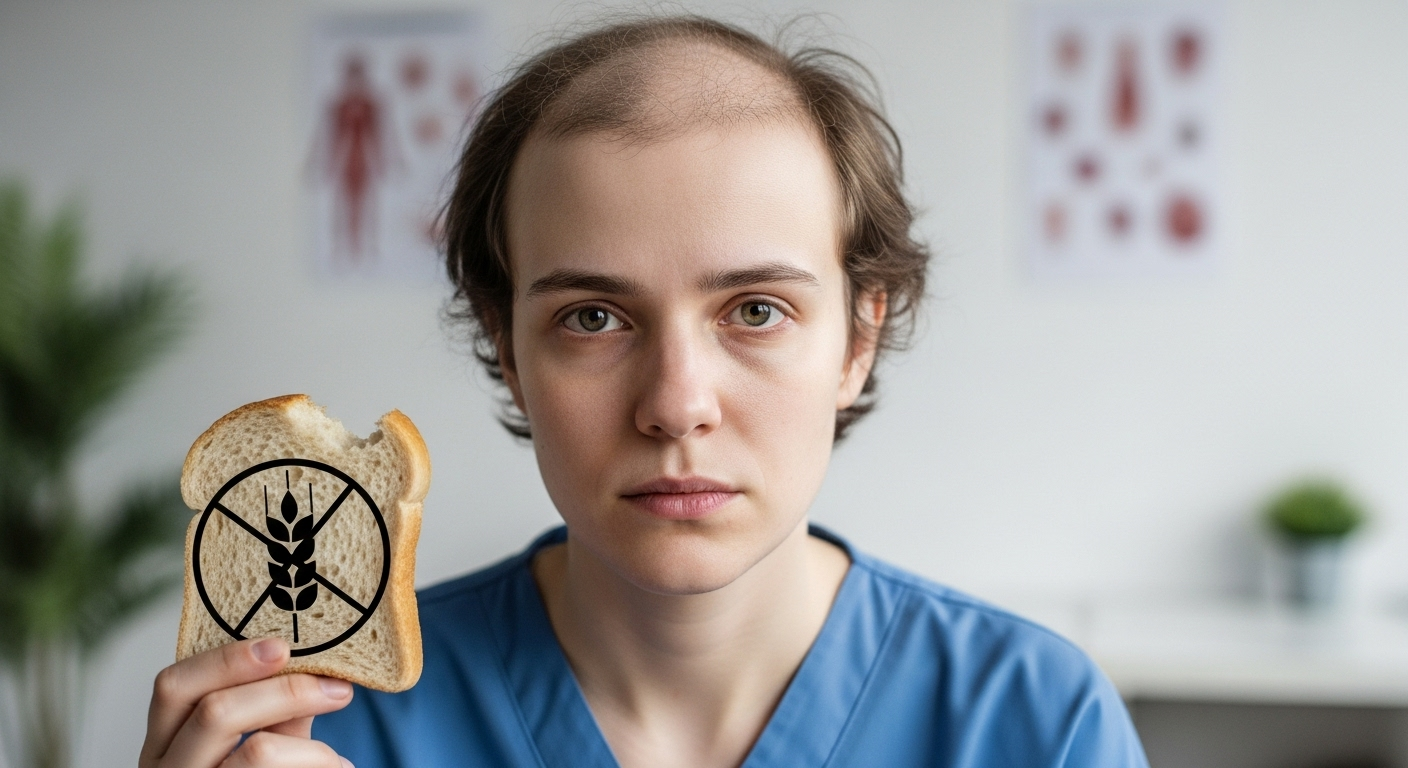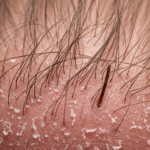If you're experiencing unexplained hair loss, you may be wondering if your diet could be to blame. Can gluten allergy cause hair loss? Yes, it can. Both celiac disease and non-celiac gluten sensitivity (NCGS) have been linked to hair loss due to nutritional deficiencies, autoimmune reactions, and hormonal imbalances. In this article, we will dive …
If you’re experiencing unexplained hair loss, you may be wondering if your diet could be to blame. Can gluten allergy cause hair loss? Yes, it can. Both celiac disease and non-celiac gluten sensitivity (NCGS) have been linked to hair loss due to nutritional deficiencies, autoimmune reactions, and hormonal imbalances.
In this article, we will dive into the connection between gluten allergies and hair loss, the underlying mechanisms, and how to manage both conditions effectively for healthy hair growth.

What Is Gluten Allergy and Its Impact on the Body?
What Is a Gluten Allergy?
A gluten allergy, more accurately referred to as gluten sensitivity or celiac disease, is an immune system response to gluten—a protein found in wheat, barley, and rye.
When individuals with celiac disease consume gluten, their immune system mistakenly attacks their small intestine, causing inflammation and damage to the intestinal lining. This can lead to malabsorption of essential nutrients like iron, zinc, and biotin, which are crucial for hair health.
Non-Celiac Gluten Sensitivity (NCGS)
Non-celiac gluten sensitivity (NCGS) is another condition where individuals experience symptoms similar to celiac disease after eating gluten, but without the autoimmune response or damage to the intestines.
Even though the mechanisms behind NCGS are not fully understood, it can still lead to symptoms such as fatigue, digestive issues, and hair loss.
How Gluten Allergy Can Lead to Hair Loss
1. Nutrient Deficiencies Due to Malabsorption
One of the main ways gluten allergy leads to hair loss is through nutrient malabsorption. When the small intestine is damaged due to celiac disease, the body is unable to properly absorb vital nutrients, including those essential for hair growth, such as:
- Iron: Critical for delivering oxygen to hair follicles.
- Zinc: Helps in hair tissue growth and repair.
- Vitamin D: Essential for hair follicle cycling.
- B Vitamins: Needed for red blood cell production and healthy hair growth.
These deficiencies can disrupt the natural hair growth cycle, leading to conditions like telogen effluvium, where hair prematurely enters the shedding phase, resulting in noticeable hair loss.
2. Autoimmune Reactions Affecting Hair Follicles
In celiac disease, the immune system’s attack on the intestine can extend to other tissues in the body, including hair follicles. The inflammation caused by these autoimmune reactions can damage hair follicles, impairing their ability to grow healthy hair.
This damage can result in conditions like alopecia areata, an autoimmune condition that causes hair follicles to be attacked, leading to patchy hair loss. Additionally, telogen effluvium, stress-induced hair shedding, may occur due to the systemic inflammation triggered by gluten intake.
3. Hormonal Imbalances
Both celiac disease and NCGS can lead to hormonal imbalances, particularly thyroid dysfunction. Hashimoto’s thyroiditis, an autoimmune thyroid disorder, is more common in people with celiac disease. When thyroid hormones are out of balance, hair thinning or loss may follow.
Thyroid dysfunction, particularly hypothyroidism, can disrupt the normal hair growth cycle, leading to dry, brittle hair and increased shedding.
Recognizing Symptoms of Gluten-Related Hair Loss

If you’re experiencing hair loss and suspect it may be related to gluten sensitivity or celiac disease, look out for these accompanying symptoms:
- Sudden or patchy hair loss: You may notice bald spots or thinning hair, particularly on the crown.
- Digestive issues: Bloating, diarrhea, or constipation may occur along with hair loss.
- Fatigue: Feeling excessively tired can indicate underlying nutrient deficiencies.
- Dermatitis herpetiformis: An itchy, blistering rash often associated with celiac disease.
- Dry or brittle hair: Gluten sensitivity can lead to weakened hair that breaks easily.
Diagnosis and Testing for Gluten Allergy and Hair Loss
1. Medical History and Physical Examination
A thorough medical history and physical examination are important steps in diagnosing gluten-related hair loss. Your healthcare provider will evaluate symptoms, family history, and any associated conditions, such as digestive issues or autoimmune disorders.
2. Blood Tests
Blood tests are used to detect specific antibodies indicative of celiac disease, such as:
- Anti-tissue transglutaminase (tTG) antibodies.
- Anti-endomysial antibodies (EMA).
These tests are most accurate when you’re still consuming gluten, as the antibodies may not be present if you’ve already eliminated gluten from your diet.
3. Skin Biopsy
For suspected cases of dermatitis herpetiformis, a skin biopsy may be performed to confirm the diagnosis.
4. Intestinal Biopsy
An intestinal biopsy may be conducted to examine the small intestine lining for damage caused by celiac disease, particularly in cases where blood tests are inconclusive.
Managing Hair Loss Associated with Gluten Allergy

1. Adhering to a Gluten-Free Diet
The most important step in managing gluten-related hair loss is eliminating gluten from your diet. This allows the small intestine to heal and nutrient absorption to improve. A gluten-free diet helps to reduce systemic inflammation and promotes better overall health, which can support hair regrowth.
2. Nutritional Supplementation
To address nutrient deficiencies caused by gluten sensitivity, supplementation may be necessary. Common supplements include:
- Iron: To correct iron deficiency anemia.
- Zinc: To promote hair growth and repair.
- Vitamin D: To support hair follicle cycling.
- B Vitamins: To aid in red blood cell formation and healthy hair growth.
Always consult with a healthcare provider before starting any supplements to ensure they are appropriate for your needs.
3. Managing Associated Autoimmune Conditions
For conditions like alopecia areata or thyroid dysfunction, specific treatments may be required. These may include:
- Topical corticosteroids for alopecia areata.
- Thyroid hormone replacement therapy for hypothyroidism or Hashimoto’s thyroiditis.
4. Regular Monitoring and Follow-Up
Ongoing medical supervision is essential to monitor the effectiveness of dietary changes and treatments. Regular check-ups can help ensure that your nutrient levels are restored and that hair health is improving.
Preventing Hair Loss in Individuals with Gluten Allergy
While hair loss can occur due to gluten allergy, taking preventive measures can help minimize the risk:
- Early diagnosis: Timely identification of celiac disease or NCGS helps prevent complications like hair loss.
- Strict gluten-free lifestyle: Consistently avoiding gluten-containing foods and products is crucial for managing both hair health and overall well-being.
- Regular health screenings: Monitoring thyroid function, vitamin levels, and any potential autoimmune conditions can help maintain hair health.
- Education and support: Engaging with support groups and healthcare providers can offer guidance on managing gluten-related disorders and hair loss.
FAQs
1. Can gluten allergy cause hair loss?
Yes, gluten allergy (especially celiac disease) can cause hair loss due to nutrient deficiencies, autoimmune reactions, and hormonal imbalances.
2. How long does it take to see hair regrowth after starting a gluten-free diet?
Hair regrowth can take 3 to 6 months after adopting a strict gluten-free diet, but it may take up to 1 year for full recovery, depending on the severity of the hair loss.
3. Can non-celiac gluten sensitivity cause hair loss?
Yes, non-celiac gluten sensitivity (NCGS) can lead to hair loss due to inflammation, nutrient malabsorption, and hormonal imbalances, even without the autoimmune response seen in celiac disease.
4. Are there any natural remedies for hair loss due to gluten allergy?
While dietary changes are key, natural remedies like scalp massages with essential oils (such as rosemary oil) may support hair health. However, they should complement medical treatments.
5. Is hair loss reversible after eliminating gluten?
In many cases, hair loss is reversible with strict adherence to a gluten-free diet and appropriate medical treatments, especially if nutrient deficiencies are addressed.
Conclusion
Understanding the link between gluten allergy and hair loss is crucial for anyone experiencing unexplained hair thinning or shedding.
By adhering to a gluten-free diet, addressing nutrient deficiencies, and managing related autoimmune conditions, many individuals can restore their hair health and overall well-being.
If you suspect a gluten-related disorder is affecting your hair, consult a healthcare professional for diagnosis and personalized advice.
If you’re experiencing hair loss and suspect it may be related to gluten sensitivity or celiac disease, schedule a consultation with Dr. Uzma Irfan, an ISHRS-certified surgeon in Islamabad today. Early intervention can lead to better outcomes and improved hair health. Let us help you restore your scalp and hair health!






